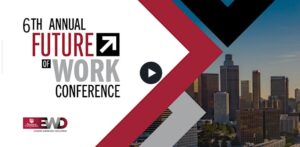
Introducing the Future of Work Conference Panelists, Part Two
Pam Sornson, JD
October 18, 2022
Of course, there is no ‘workforce’ without workers. And, increasingly, those workers need advanced skills and occupationally directed training to find and secure the jobs they want doing the work they want to do. Global events of the past decade have driven the evolution of skill sets beyond those typically achieved through high school. Technology, in particular, has transformed many occupations, most of which are still highly valued and, in many cases, well compensated. In addition to “soft skills” (critical thinking, active learning, problem-solving, and resilience, among many others), today’s and tomorrow’s workforce must also achieve competency in technological skills, such as digital marketing, automation management, information security, Internet of Things management, etc. To gain these skills and earn a satisfying career, most workers in the future will need to attend some form of post-high school education program. California’s community colleges are building the foundations to provide that strata of educational excellence.
Not surprisingly, the Future of Work conference includes education experts as panelists, two of whom are also featured guests on the PCC EWD podcast, Will Walls and Dr. Su Jin Jez.

Academics
Sandra Sanchez, Interim Vice Chancellor, California Community Colleges Chancellor’s Office
Ms. Sanchez has a long history of involvement in the workforce development sector, having managed that division at Santa Monica College and in her role as Dean of Economic and Workforce Development at Los Angeles Harbor College.
She is presently serving as Interim Vice Chancellor in the California Community Colleges Chancellor’s Office. Here, she maintains a vigilant eye over a diverse plethora of workforce development aspects, including entrepreneurial development, adult education, apprenticeships, nursing and allied health, and K-12 partnerships. Her contribution to the conference discussion will ensure that these critical educational avenues are included as fundamental elements of workforce development.
Micah Young, M.D., Dean, Health Sciences Division, Pasadena City College
Pasadena City College facilitates a robust catalog of healthcare education programs, each of which is designed to provide the well-skilled healthcare workers that are in such high demand now and will remain in demand for the foreseeable future. Employment in health-related occupations is anticipated to grow as much as 13% between 2021 and 2031, adding approximately 2,000,000 new jobs over that decade. The healthcare sector is projected to grow faster than any other occupational industrial category.
In the role of leader of the Health Sciences division, Dr. Young ensures that appropriately qualified students attain admission to his programs. He also assures that the academic and professional instructors offer training and skills relating to all aspects of these health-related occupations, including mastery of the emerging technological expertise demanded by post-COVID and evolving technology capacities.

Learners
One voice that is too frequently left out of the workforce development conversation is that of the student. Significant educational resources are directed toward achieving ‘student success.’ That value is commonly measured by institution-based metrics, such as retention rates, graduation rates, time to completion, and academic performance, to name just a few. From a student perspective, however, educational “success” is measured not by what was achieved in the classroom but instead by achievements gained in the work world.
Will Walls, Student Leader, Pasadena City College
PCC alum Will Walls joined in a podcast with Salvatrice Cummo, PCC’s Vice President for Economic and Workforce Development, to share his Community College experience as a student. Entering Community College after a long former career, Walls was the quintessential “nontraditional learner.” He was older and had already attained success in another field. However, he was also a “typical” Community College student: he wanted to move his life in a different direction. Walls knew he wanted to change his life, but he did not understand what he wanted to do. Inspired by the college success of a friend, he chose to attend their alma mater to achieve a comparable level of success. He not only found a career he loves (using his linguistic anthropology degree to provide sales pitch coaching to small business entrepreneurs), he also gained critical occupational skills working for PCC’s Robert G. Freeman Center for Career and Completion. By his own account, his PCC college experience has indeed changed his life in ways he could not have predicted.
All of the Above
Dr. Su Jin Jez, Executive Director, California Competes
Dr. Jez cites her parents’ challenging early circumstances as the drivers of her personal pursuit of higher educational excellence. She is a first-generation college attendee and holds both a master’s and a Ph.D. degree from Stanford University. She’s acted as an Associate Professor of Public Policy and Administration at California State University Sacramento and as the Associate Director of the Sacramento State Doctorate in Educational Leadership program. Her applied research has provided guidance for California’s community colleges, the State University system, and its Bureau for Private Postsecondary Education. She has published extensively and presents across the country on critical higher education and system change issues.
Currently, Dr. Jez is the executive director of open “California Competes,” a higher education think tank working to solve the state’s challenging social and economic problems. The agency conducts rigorous research studies to inform decision-makers and workforce and economic development stakeholders about issues, concerns, problems, and opportunities emerging throughout the state’s active industrial complex. Additionally, the organization embeds equitable and racially just principles and concepts into its work to influence and direct appropriate workforce outcomes. Dr. Jez will offer the opening keynote presentation.
The Future of Work panel discussion will be invaluable and is not to be missed.
Keep your eyes on your inbox for the November 1st edition of the Pulse, where we will introduce the education and workforce development experts from Pasadena City College who will be hosting, guiding, and sharing their wisdom with Future of Work conference attendees.


